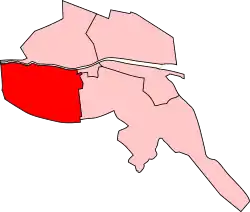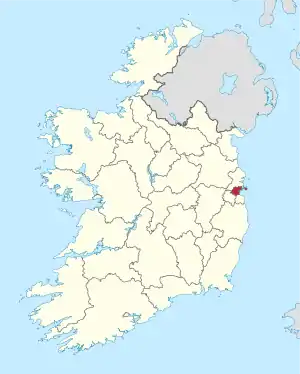Dublin St Patrick's (UK Parliament constituency)
Dublin St Patrick's, a division of Dublin, was a borough constituency in Ireland. It returned one Member of Parliament (MP) to the United Kingdom House of Commons from 1885 until 1922.
| Dublin St Patrick's | |
|---|---|
| Former borough constituency for the House of Commons | |
 Dublin St Patrick's constituency within Dublin, as it existed from 1885 to 1918. | |
 Dublin within Ireland. Map utilises the modern administrative boundaries. | |
| 1885–1922 | |
| Seats | 1 |
| Created from | Dublin City |
| Replaced by | Dublin South |
From the dissolution of 1922, the area was no longer represented in the UK Parliament.
Boundaries
This constituency was named for St Patrick's Cathedral and comprised the southwest part of the city of Dublin.[1]
From 1885 to 1918, it was defined as:[2]
The Merchants' Quay, Usher's Quay and Wood Quay wards of the borough of Dublin.
From 1918 to 1922, it was defined as:[3]
The Merchants' Quay and Wood Quay wards of the County Borough of Dublin.
History
Prior to the 1885 general election, the city was the undivided two-member Dublin City constituency. Under the Redistribution of Seats Act 1885, Dublin was divided into four divisions: St Patrick's, College Green, Dublin Harbour and St Stephen's Green.
Under the Redistribution of Seats (Ireland) Act 1918, the city was allocated seven seats: in addition to the four existing constituencies, the new divisions were Clontarf, St James's and St Michan's.[4] St Patrick's lost territory to St James's.
Sinn Féin used this election to elect members of Dáil Éireann, inviting all those elected in Ireland to sit as a Teachta Dála (known in English as a Deputy) in the Dáil, although only the Sinn Féin members attended. St Patrick's in 1918 gave Sinn Féin 63% of the vote. Constance Markievicz was the first woman to win a parliamentary election in Britain and Ireland, at the first election where women were permitted to stand as candidates.
Under the Government of Ireland Act 1920, the area was combined with the St Stephen's Green Division to form Dublin South, a 4-seat constituency for the Southern Ireland House of Commons and a single constituency at Westminster.[5] At the 1921 election for the Southern Ireland House of Commons, the four seats were won uncontested by Sinn Féin, who treated it as part of the election to the Second Dáil. Constance Markievicz was one of the four TDs for Dublin South.
Under s. 1(4) of the Irish Free State (Agreement) Act 1922, no writ was to be issued "for a constituency in Ireland other than a constituency in Northern Ireland".[6] Therefore, no vote was held in Dublin South at the 1922 United Kingdom general election on 15 November 1922, shortly before the Irish Free State left the United Kingdom on 6 December 1922.
Members of Parliament
| From | To | Name[7] | Party | |
|---|---|---|---|---|
| 1885 | 1892 | William Martin Murphy | Nationalist (IPP)[lower-alpha 1] | |
| 1892 | 1918 | William Field | Irish National League (Parnellite) (IPP) | |
| 1918 | 1922 | Constance Markievicz | Sinn Féin | |
- Irish National Federation (Anti-Parnellite) from December 1890.
Elections
Elections in the 1880s
| Party | Candidate | Votes | % | ±% | |
|---|---|---|---|---|---|
| Irish Parliamentary | William Martin Murphy | 5,330 | 82.1 | ||
| Irish Conservative | Maurice Edward Dockrell | 1,162 | 17.9 | ||
| Majority | 4,168 | 64.2 | |||
| Turnout | 6,492 | 72.5 | |||
| Registered electors | 8,952 | ||||
| Irish Parliamentary win (new seat) | |||||
| Party | Candidate | Votes | % | ±% | |
|---|---|---|---|---|---|
| Irish Parliamentary | William Martin Murphy | Unopposed | |||
| Irish Parliamentary hold | |||||
Elections in the 1890s
| Party | Candidate | Votes | % | ±% | |
|---|---|---|---|---|---|
| Irish National League | William Field | 3,694 | 76.9 | N/A | |
| Irish National Federation | William Martin Murphy | 1,110 | 23.1 | N/A | |
| Majority | 2,584 | 53.8 | N/A | ||
| Turnout | 4,804 | 66.2 | N/A | ||
| Registered electors | 7,261 | ||||
| Irish National League gain from Irish Parliamentary | Swing | N/A | |||
| Party | Candidate | Votes | % | ±% | |
|---|---|---|---|---|---|
| Irish National League | William Field | Unopposed | |||
| Irish National League hold | |||||
Elections in the 1900s
| Party | Candidate | Votes | % | ±% | |
|---|---|---|---|---|---|
| Irish Parliamentary | William Field | Unopposed | |||
| Irish Parliamentary hold | |||||
| Party | Candidate | Votes | % | ±% | |
|---|---|---|---|---|---|
| Irish Parliamentary | William Field | Unopposed | |||
| Irish Parliamentary hold | |||||
Elections in the 1910s
| Party | Candidate | Votes | % | ±% | |
|---|---|---|---|---|---|
| Irish Parliamentary | William Field | Unopposed | |||
| Irish Parliamentary hold | |||||
| Party | Candidate | Votes | % | ±% | |
|---|---|---|---|---|---|
| Irish Parliamentary | William Field | Unopposed | |||
| Irish Parliamentary hold | |||||
| Party | Candidate | Votes | % | ±% | |
|---|---|---|---|---|---|
| Sinn Féin | Constance de Markievicz | 7,835 | 65.85 | New | |
| Irish Parliamentary | William Field | 3,752 | 31.53 | N/A | |
| Independent Nationalist | James Joseph Kelly | 312 | 2.62 | New | |
| Majority | 4,083 | 34.32 | N/A | ||
| Turnout | 11,899 | 63.34 | N/A | ||
| Registered electors | 18,785 | ||||
| Sinn Féin gain from Irish Parliamentary | Swing | N/A | |||
Notes, citations and sources
Citations
- "Report of the Boundary Commission (Ireland): Map". Enhanced British Parliamentary Papers on Ireland. DIPPAM: Documenting Ireland, Parliament, People and Migration. p. 18. Retrieved 1 October 2022.
- "Redistribution of Seats Act, 1885 (48 & 49 Vict., c. 23)". Archive.org. Incorporated Council of Law Reporting for England and Wales. p. 143. Retrieved 1 October 2022.
- "Report of the Boundary Commission (Ireland)". Enhanced British Parliamentary Papers on Ireland. DIPPAM: Documenting Ireland, Parliament, People and Migration. p. 35. Retrieved 1 October 2022.
- "Redistribution of seats (Ireland) Act, 1918". Retrieved 1 October 2022.
- "Government of Ireland Act 1920 (10 & 11 Geo. 5, c. 67): Fifth Schedule". legislation.gov.uk. The National Archives. Retrieved 27 May 2022.
- "Irish Free State (Agreement) Act 1922 (12 & 13 Geo. 5, c. 4)". Historical Documents. Archived from the original on 15 March 2012.
- Leigh Rayment's Historical List of MPs – Constituencies beginning with "S" (part 1)
- Walker 1978.
- "The Irish General Election of 1918". Ark.ac.uk. Retrieved 11 November 2017.
- General Election: 14 December 1918 – Dublin St Stephen's, ElectionsIreland.org
Sources
- Walker, B.M., ed. (1978). Parliamentary Election Results in Ireland, 1801–1922. Dublin: Royal Irish Academy. ISBN 0901714127.
- Boundary Commission (Ireland) established in 1917 to redistribute seats in the House of Commons under the terms of the Representation of the People Bill, 1917 (1917). "Schedule 10 : Parliamentary borough of Dublin" (PDF). Report. Vol. CSO/RP/1917/29520/36. National Archives of Ireland.